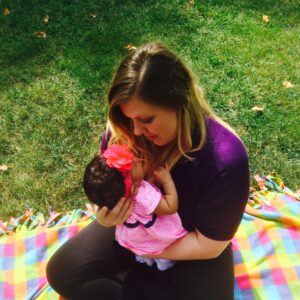“Let me try.”
A stranger. A complete stranger. I allowed a stranger to hold you. It has been weeks, and you’re still crying every evening around the same time for the same amount of time. The doctor told me it’s just colic and that it’ll pass, but his nonchalant reaction is in utter opposition to how I feel, to how you obviously feel.
Colic is devastating.
And no matter how many times people tell you the baby is OK . . . when you watch your baby cry that much, you know they can’t be. I tried to take you outside to see if a change of scenery would help. I’ve been walking up this street, a street with freshly mowed lawns and vibrant flowers, for what feels like an eternity. I’m hushing you sweetly and holding you close. Because even though nothing I do takes it away, I want you to know I’m here, that I’m trying. But I’m crying too.
RELATED: My Baby Has Colic and it’s Exhausting
When you can’t calm the baby—the one thing all moms can do—you can’t help but feel like you’re failing. Something is so painfully wrong, but you don’t know what it is, how to fix it, or what to do in the meantime.
It wears on you and makes you feel insecure in a role you were only just given.
She comes up to me, this stranger, and says, “Sometimes you have to hold them like this.” She takes you from me and rests your belly on her forearm. I know this one too. I’ve tried it too. But I am so desperate for something, anything—anyone—to fix it, to help you. You don’t calm down for her like she thought you would, so she returns you to my arms and goes about her walk. I feel defeated.
I wish it were that simple. That some quick trick could take away your tears, but I haven’t found it yet. And I’m trying.
Becoming a mom for the first time is like nothing else in this world—it’s extreme joy, extreme tiredness, extreme struggle, extreme love. Becoming a mom is an honor, and though our society urges moms to not place so much self-worth in the role, it’s hard not to wonder, “Am I doing this right? Am I a good mom?” It’s a common question for any mom, but for the mom who was just told her baby has colic, she then might also wonder, “What did I do wrong? What can I do to help?”
And when those answers can’t be found in a conversation with a friend or a desperate call home to mom or on the other end of a late-night Google search, sometimes you can’t help but let that dark thought creep in . . .
You’re not good enough. You’re not a good mom.
It’s not quite evening, so you’re laughing now, giggling at my silly voices and your dad’s peek-a-booing. We decide to take you to a friend’s BBQ. I know it’s right around the time you’ll start crying, but we hope the change in routine will deter the episode. We were wrong. Not long into the party, your colic sets in. I gently hum against your head as I sway you, but trying to avoid the concerned looks does me in, and I retreat into the house.
Your daddy is packing up your diaper bag to go when the mother of a new friend says to me, “Oh no, is he ready for bed?” I tell her no, that we were told you have colic. She looks at me knowingly, and says, “My daughter had colic too.”
The tears in my eyes give me away. She can see I’m drowning.
“Oh, honey,” she rests her hand on my shoulder, “He’s going to be OK, and you’re doing great. You’re a good mom.”
And instantly, I feel seen.
I had heard encouraging words from family and friends no doubt, but something about this stranger saying them gives me the courage to keep going. Her words made me feel like we could get through this.
RELATED: Admire the Baby, But Don’t Forget to Nurture the Mother
And we did. Your colic phased out, and by your fifth month, it was over. But that time shaped me forever. It made me see how important it is to encourage moms and dads with every opportunity we get.
Advice is needed. Ideas are needed. Hugs and crying sessions are all needed in motherhood. But never underestimate the power of the phrase, “You’re a good mom.” Next time you get the chance, just tell her she’s a good mom.

If you liked this, you'll love our book, SO GOD MADE A MOTHER available now!
Order NowCheck out our new Keepsake Companion Journal that pairs with our So God Made a Mother book!
Order Now

















